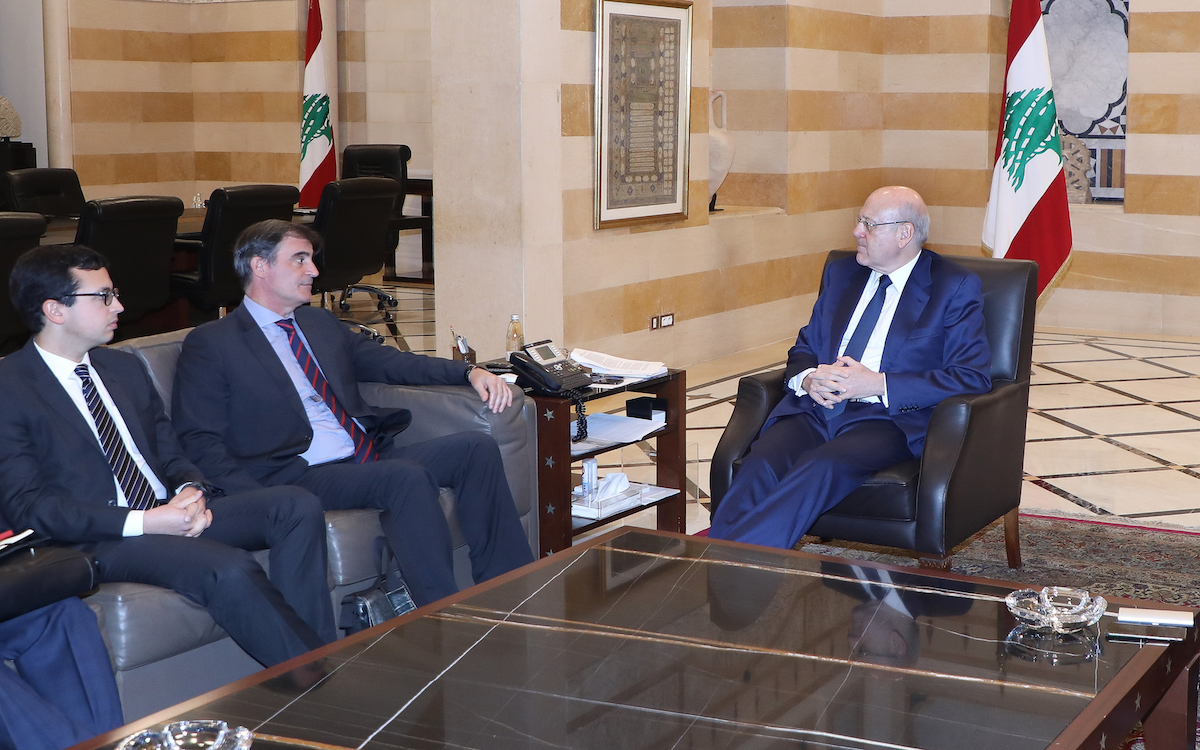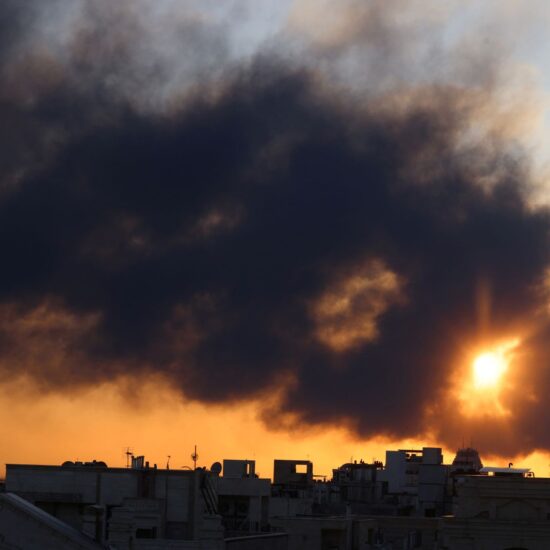
In Arabic, the word, which means ignore, often refers to a situation in which someone is putting off something that they have been told to do.
This is what the Lebanese government has been doing for nearly four years now when it comes to the economic crisis. Tetnish (تطنيش).
Once again, the International Monetary Fund has told Lebanon’s politicians that they need to implement reforms or else the ongoing economic crisis is going to worsen, but the likelihood of them actually doing anything about it remains slim to none.
According to the IMF, in a recent report, Lebanon will continue to see triple-digit inflation and ballooning public debt if action is not taken, adding that public debt could go as high as 550 percent of GBP by 2027.
The problem is that the IMF, World Bank, world leaders, economists and everyone’s parents with a WhatsApp account have been saying the same thing since the start of the crisis – but there is nothing being done to mitigate it.
Instead, the country’s politicians have been more than happy to talk endlessly about the changes that need to occur and how important it is to bring about an end to the crisis for the sake of the Lebanese people, but they have consistently fallen short when it comes to taking action.
Now, even if they wanted to pass reforms, Parliament legally could not since there is no president and Parliament is constitutionally forbidden from taking on any other duties until a new one is elected – although there is a vague stipulation that they can take on other business if there is an emergency.
For 244 days Lebanon has been without a president, having failed 12 times to elect one. There is no indication that someone will be elected any time soon.
Lebanon has become dependent on international donations to keep the country afloat. The international community is essentially paying for the army’s salaries and, now, the World Bank is paying $200 million to help finance Lebanon’s agriculture sector.
In Lebanon
Shooting in Bcharre: On Saturday, July 1, a gunman shot and killed two people in the Bcharre area of northern Lebanon in an incident that sparked sectarian tensions.
According to reports, Haitham and Malek Tawk were shot and killed in the area between Qornet al-Sawda and Bkaasafrine. There have been conflicting reports of the incident, with some claiming that they were shot by a sniper while others say it was a shootout between two groups.
Qornet al-Sawda has also been a contentious area with Hezbollah’s northern representative, Mohammed Saleh supposedly trying to have the area put under the ownership to the Bkaasafrine Municipality with the help of Tripoli MP Faisal Karami in what has seemingly become one of a growing number of real estate disputes.
Bcharre, the town of the two deceased males is the hometown of Samir Geagea the leader of the Lebanese Forces and the Tawk family is one of the town’s biggest families.
In response to the incident, political and religious leaders have called for calm and an end to any sectarian strife – which was caused due to the shooting taking place near Sunni majority Dinniyeh and the victims being from Maronite majority Bcharre – and the family calling for a transparent investigation into the incident.
Five people have since been detained in Bcharre and are currently under investigation. The shooters remain unknown with a lot of speculation being cast on anyone from drug dealers to smugglers who operate in the area to groups allied with Hezbollah who reportedly have positions in the nearby mountains.
A shocking crime: Another heinous crime took place in Lebanon over the weekend.
Six-year-old Lynn Talib died while staying with her maternal grandparents in Miniyeh.
Following her death, doctors examined her body to find that the child had been raped prior to her death.
There is a further investigation into Talib’s rape and death. Her father’s family also filed a lawsuit against her mother’s parents.
Charged: The former assistant to embattled Central Bank Governor Riad Salameh has been charged in France as part of the country’s probe into alleged financial crimes.
According to sources in France, Marianne Hoayek was questioned on Friday, June 30, and placed under investigation for criminal conspiracy and money laundering.
Hoayek maintains her innocence.
Salameh, her former boss, has had international arrest warrants issued for him by Germany and France over money laundering allegations, which he denies.
Drones: Hezbollah claimed on Monday, June 26, that it had shot down an Israeli drone that was flying over South Lebanon.
#Hezbollah said it shot down an Israeli drone in Wadi al-Aziyeh near the South #Lebanon village of Zibqin. #Israel’s military acknowledged the downing during “routine” activity and that they are not worried about information being leaked. #حزب_الله #لبنان #اسرائيل
— Nicholas Frakes | نيكولاس فريكس (@nicfrakesjourno) June 26, 2023
The drone was reportedly downed in Wadi al-Aziyeh, near the town of Zabqin, which sits near the Lebanese-Israeli border.
Israel confirmed that the drone had been downed during “routine” activity and that they were not concerned about any information being leaked.
Israel routinely flies drones over Lebanon, with Hezbollah sometimes sending its own drones into Israel, most of which are shot down.
Fire: A fire broke out near Beirut’s airport on July 1, leading to a flood of images and videos of the large black plumes of smoke on social media.
The fire was reportedly caused by the burning of plastic materials in the Ouzai area of South Beirut.
It was quickly extinguished with the help of several local firefighting units.
In the region
The siege of Jenin: Israeli forces have killed at least eight and injured 27 others so far in a large-scale assault on the Jenin refugee camp in the occupied West Bank.
The operation began at around 1 am Monday morning with a drone strike on the camp – a rare action given the more prominent use of commando units by the Israelis in the occupied territories.
Israeli officials say that they are leading this assault in order to combat “terrorism” and that there is no specific end date for the assault, adding that it would continue indefinitely.
Jenin has often been besieged by Israeli forces who have used the presence of militant groups like Islamic Jihad, Hamas and the Jenin Brigades as justification.
US consulate targeted: A man shot at the US Consulate in Jeddah on Wednesday, June 28, killing one security guard.
The rare shootout also saw the gunman killed. He has not yet been identified.
In addition to the consulate in Jeddah, the US has another consulate in Dhahran, near Bahrain, and an embassy in the Saudi capital Riyadh.
The Jeddah consulate had been targeted in a shooting in 2004, as well as a suicide bombing in 2016.
Searching for answers: The United Nations on June 29 voted to form an independent international institution that would search for the missing in both government and opposition-held territories in Syria.
The UN now has three months to set up the institution and begin hiring staff.
The resolution was passed 83-11 with 62 countries abstaining, including Lebanon, which has been criticized for the move as many Lebanese still have their own who are missing in Syria from the time of the Syrian occupation which only ended in 2005.
Given that Syria and its key allies, namely Russian, Iran, and China, all voted against the resolution, it is unclear how much the new project will actually be able to accomplish without cooperation from the Syrian government which, in the past, has been unwilling to assist in international investigations.
There are an estimated 130,000 who have gone missing in Syria since the start of the civil war.
On leave: The United States’s envoy to Iran, Robert Malley, has been put on unpaid leave over accusations that he mishandled classified documents.
Malley has said that he expects the issue to be resolved in his favor quickly.
There has been no information about what the documents pertained to and how they were mishandled.
Malley has been the lead on the Biden administration’s efforts to restart the nuclear deal with Iran.
Storm the gates: Thousands are protesting in Iraq following the Swedish government’s decision to allow people to burn the Quran during protests.
Many of the protesters are followers of the influential Shiite cleric Muqtada al-Sadr, who has condemned Sweden’s allowance of the Quran to be burned.
On June 29, protesters briefly stormed the Swedish Embassy in Baghdad, a day after a man in Sweden burnt a Quran in front of a mosque.
This all came during Eid al-Adha celebrations throughout the Muslim world which mark the end of the pilgrimage to Mecca.
What we’re reading
Let’s go to the beach…or not: Summer is heating up in Lebanon and many people enjoy cooling off at the beach. However, NOW’s Dana Hourany found that it is becoming increasingly hard to access public beaches in the country.
Profitable sustainability: There has been a growing push around the world for more sustainable options to combat climate change. Rodayna Raydan wrote about how some in Lebanon are turning the waste from olive trees into an energy solution that can also bring in a little bit of cash.
Building corruption: With the growing threat of climate change, an increasing number of people are trying to move to the Iraqi capital of Baghdad. The problem that The Washington Post’s Louisa Loveluck and Mustafa Salim found is that this construction boom is quickly being fueled by corruption and is pricing many average Iraqis out.
Lebanon+
Podcasts: In the latest episode of The Beirut Banyan, Ronnie Chatah spoke with writer and policy advisor Camille Ammoun about his writing, psycho-geography and urban planning, and the role that civil society played in both the 2005 and 2019 uprisings.
Sarah al-Asmar hosts Samir Kassir Foundation spokesperson Jad Shahrour in the latest from GENXZ where they discuss the legacy of Samir Kassir, threats against digital platforms, and how the ongoing political paralysis has affected revised legislation.
This episode of Sarde after dinner goes out to the foodies. Médéa Azouri and Mouin Jaber speak with the one and only Chef Antoine about how he mastered the art of cooking on live television for nearly three decades, how he maintains credibility with his audience amid the current situation and much, much more food-related topics.
Until next week, follow NOW Lebanon on Twitter, Instagram, Facebook, and LinkedIn. And stay safe!








